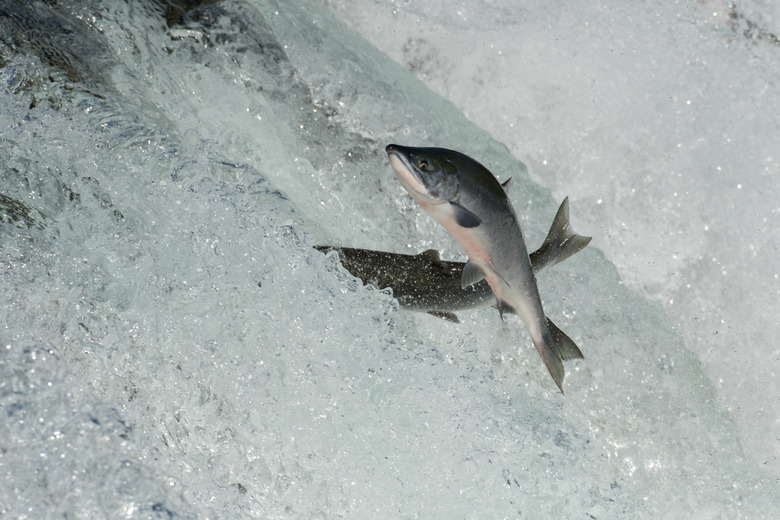What Do Salmon Eat?
Salmon are a tasty, tempting and readily available fish that can add a healthy staple to any diet. In fact, entire regimes, like Dr. Hoffman's "Salmon and Salad Diet," have been built around this meaty and magnificent fish. While all this salmon feasting is going on, folks may forget that salmon have their own tasty food selection on which they dine.
Features
Features
Salmon eat meat, or at least meat and protein products, as the little critters are definitely carnivores. In the wild, salmon may dine on zooplankton and small invertebrates. Once they get a tad bigger, salmon can readily eat smaller fish, like herring, or the shrimp-like critter called krill. Salmon kept in farms are usually fed a ground-up mixture of other fish and organisms from the ocean.
Types
Types
Salmon comes in nearly as many types as there are ways to prepare them for dinner. Atlantic salmon swim about the Atlantic Ocean, while the Pacific Ocean features seven different salmon varieties. They include:
- cherry salmon
- Chinook salmon
- chum salmon
- Coho salmon
- pink salmon
- Sockeye salmon
Still more salmon is found in primarily fresh water, these are the steelhead or rainbow trout and the cutthroat.
Geography
Geography
Salomon hatch in fresh water, migrate to the ocean and then return to fresh water to create new young. Most are generally found in streams and tributaries leading to either the Atlantic or Pacific oceans. Atlantic salmon is much more common on restaurant menus, even in places abutting the Pacific like California, because they are the type that are usually farmed. A couple of varieties are only found in Asian seas and still more salmon are found primarily in fresh water basins. Popular salmons places in the United States include Alaska, the Great Lakes and the Pacific Northwest, namely Washington, Oregon and Northern California.
Considerations
Considerations
While salmon are busy eating plankton and the like, plenty of things are ready to feast on salmon. This hearty, thick fish is a great staple for humans, who love salmon steaks broiled, seared or rubbed in spicy Cajun seasonings and thrown on a grill. Other creates that delight on dining salmon include birds, bears, sea lions, dolphins and larger predatory fish.
Warning
Warning
Farming salmon comes with a couple of hazards. Salmon that were farmed and fed on vegetable, rather than animal proteins as a way to save money may be lacking in Omega-3, which is one of the main reasons salmon are so healthy for a human diet. Farmed salmon are also highly susceptible to sea lice, a relentless parasite, that can spread throughout the salmon farm in the blink of an eye. The sea lice can also be spread into the wild if the farmed salmon are kept in connecting waters.
Cite This Article
MLA
Gargulinski, Ryn. "What Do Salmon Eat?" sciencing.com, https://www.sciencing.com/what-do-salmon-eat-4621298/. 22 November 2019.
APA
Gargulinski, Ryn. (2019, November 22). What Do Salmon Eat?. sciencing.com. Retrieved from https://www.sciencing.com/what-do-salmon-eat-4621298/
Chicago
Gargulinski, Ryn. What Do Salmon Eat? last modified March 24, 2022. https://www.sciencing.com/what-do-salmon-eat-4621298/
